Waqf Board Amendment Bill, 2024: Controversies and Concerns of the Muslim Community
The Waqf Board Amendment Bill, 2024, has sparked intense debates and discussions, with many viewing it as another political maneuver designed to weaken Muslim representation and influence in India. On the surface, the bill purports to establish an inclusive system that guarantees equal representation across various sectors—politics, employment, poverty eradication, and national development—regardless of caste, gender, color, or creed. However, beneath these claims of social welfarism and economic upliftment lies a political strategy seemingly aimed at securing specific electoral gains.
It is evident that the bill is a continuation of a pattern by certain political entities and central regimes that have repeatedly attempted to marginalize Muslims through various means. These efforts range from propagating anti-Sharia narratives in popular media, such as through films like The Kerala Story and Hamare Baarah[1], to using social media, television news channels, and religious gatherings to shape public opinion against Islamic principles. This latest legislative push by the BJP-led government is viewed by many as an extension of these tactics, aiming to manipulate the Indian Parliament for partisan objectives.
The timing of the Waqf Board Amendment Bill is particularly contentious. India is currently navigating a complex geopolitical landscape with major regime changes and political instability in neighboring countries like Bangladesh, Myanmar, Sri Lanka, and a loss of influence in the Maldives. Instead of focusing on these regional challenges, the Modi administration is preoccupied with enacting what are perceived as anti-constitutional and anti-religious laws, such as the Waqf Board Amendment Bill 2024. The proposed amendments aim to rename the act as the Unified Waqf Management, Empowerment, Efficiency, and Development Act of 1995, which many view as an unlawful attempt to dilute the autonomy and influence of Waqf boards across India.
Defending the bill, Kiren Rijiju, the Minister of Minority Affairs, has stated that the proposed amendments do not infringe upon anyone's rights. Instead, they are intended to expand representation within the Waqf Boards to include minority Muslims among Muslims and to address the issue of under-representation of women by ensuring that at least two women hold top representative positions or serve on Waqf Board Tribunals[2] [3]. However, this rationale has done little to alleviate concerns that the amendments are yet another step towards diminishing Muslim authority and autonomy in managing their own religious and social affairs.
Moreover, while the BJP claims the Waqf Board Amendment Bill, 2024, is a step toward gender balance and equal representation, it raises questions about the party's sincerity in promoting inclusivity. In contrast to the Trinamool Congress's strong commitment to women's representation, the BJP, despite its national reach, has one of the lowest percentages of female MPs and no Muslim MPs among its recent Lok Sabha victories[4]. This contradiction suggests a pattern of selective representation, casting doubt on the true intent behind the BJP's legislative moves, perceived by many as an attempt to manipulate democratic structures for political gain rather than genuine social reform.
While proposing the Waqf Amendment Bill 2024, Minority Affairs Minister Kiren Rijiju criticized the Opposition[5], asserting that the bill is necessary due to several issues, including mafia infiltration in Waqf properties, arbitrary land acquisition by Waqf authorities, and mismanagement leading to failed eviction drives. These concerns are cited as the primary reasons behind the proposed amendments to the Waqf Act of 1995. However, the bill's passage is viewed by critics as a threat to diversity and a violation of fundamental rights, potentially undermining India's commitment to justice.
Historically, Indian law-making has considered the needs and rights of minorities, a principle rooted in the Constituent Assembly's actions in 1950[6]. Muslims, like Jains, Christians, Buddhists, Parsis, and Sikhs, are an official minority in India, with their fundamental rights protected under Article 25, which ensures the right to manage religious places and properties. As the Waqf Board is an Islamic entity, Muslims have the fundamental right to manage it autonomously. The newly proposed participation of non-Muslims and increased government intervention under the guise of addressing mismanagement and other issues is seen as a direct violation of these rights, particularly Article 25, which protects religious freedoms.
Five Major Malicious Allegations
In his speech, BJP's Minority Affairs Minister Kiren Rijiju outlined five key allegations that have been used to justify the proposed amendments to the Waqf Board Act of 1995. These allegations, which have fueled sectarian controversy across India, are as follows[7]:
- Arbitrary Decisions on Land Ownership: The first allegation is that whenever the Waqf Board claims any land within India as its own, the decision is taken arbitrarily, without due process[8].
- Lack of Government Oversight: The second allegation asserts that the Waqf Board operates entirely without government intervention in its decision-making processes and related procedures.
- Mafia Infiltration: The third allegation points to the infiltration of mafia elements and criminals into Waqf properties, which has supposedly rendered the Waqf administration ineffective and unable to manage these threats[9].
- Political Blame Game: Rijiju's statement that "because you (INC) couldn’t do it, we had to bring their amendments" suggests a political strategy by the BJP to portray itself as a protector of ordinary Muslims while accusing the opposition of failing to manage the Waqf Board effectively[10].
- Mismanagement and Eviction Failures: The fifth allegation claims mismanagement by the Waqf Board and accuses its officials of allowing encroachments and failing to conduct a successful "Eviction Drive[11]."
Satisfactory Responses to These Allegations
The first allegation put forth by Kiren Rijiju, suggesting that any land claimed by the Waqf Board is arbitrarily recognized as its property, is fundamentally baseless and lacks historical accuracy. This claim disregards the reality that India, shaped by the principles of the Constituent Assembly and its inclusive Constitution, does not permit such arbitrary decisions, especially regarding property ownership. The controversy surrounding the Babri Masjid serves as a stark counterexample to Rijiju's allegation.
Despite the Waqf Board's claims and numerous legal efforts to retain ownership of the Babri Masjid—historically recognized as a Muslim place of worship—these claims were ultimately rejected[12]. The mosque was demolished in 1992 by RSS and BJP-affiliated groups, and the 2019 Supreme Court verdict awarded the disputed land to Hindu claimants, not the Waqf Board. This historical precedent directly contradicts the assertion that Waqf properties are arbitrarily granted ownership, highlighting that Rijiju's claim is a straw man fallacy without factual support. The events around the Babri Masjid demonstrate that the Waqf Board's ownership claims do not automatically translate into uncontested rights, refuting the first allegation and exposing it as a misrepresentation of the actual legal and historical context in India.
Similarly, the second allegation, as viewed by the author and the Indian Constitution, is entirely based on what is termed as the Modi administration’s "flawed lie." Contrary to the claim that there is no government intervention in the Waqf Board’s land acquisition and possession decisions, the Waqf Board Act of 1995 and Indian federal law require the Waqf Board to undergo a thorough procedural process when claiming property. It is misleading to argue that government oversight is absent because when a state Waqf Board claims property, the state government conducts a survey through a Survey Commission to assess and document the properties. This commission examines the nature, purpose, and use of the properties, such as mosques, madrasas, ashrams, schools, and hospitals, and evaluates the financial aspects, including construction costs and potential income. Additionally, the Land Revenue Department imposes taxes on each Waqf property, and the state government can order multiple surveys if needed. Furthermore, if disputes arise, Mutawallis (managers) can appeal to the Waqf Board Tribunal, which is constitutionally established under Section 83 of the Waqf Board Act of 1995[13].
Section 83 outlines the creation and composition of the Waqf Tribunal, which must include members from the State Judicial Service, State Civil Services, and experts in Muslim law, ensuring a balanced and authoritative adjudication process[14]. The Tribunal operates with the same authority as a civil court the same powers as a civil court under the Code of Civil Procedure, 1908 (5 of 1908) as per Seventh Provision of the Section 83. Supreme Court, being the highest tribunal of India, is vested with Article 136 of Indian Constitution that grants the Supreme Court discretionary authority to allow special leave to appeal concerning any judgment, decree, or order issued by any court or tribunal within the country, including rulings from the High Court in waqf matters[15].
This comprehensive oversight clearly shows that the Waqf Board and its Tribunal are constitutionally regulated, with their formation and functioning guided by Supreme Court rulings, state government directives, and constitutional provisions. Given this structure, it is evident that the Supreme Court, state governments, and the Constitution are integral parts of the Indian government. Thus, Kiren Rijiju's assertion of no government intervention in Waqf Board decisions is entirely unfounded and lacks any factual basis.
The third allegation[16], claiming that "the Mafia and Rowdies have infiltrated Waqf properties, rendering the Waqf administration ineffective and lacking the capability to combat them," is a clear example of a straw man fallacy. Contrary to this assertion, numerous reliable sources report that both state and central governments have themselves attempted to encroach upon and infiltrate various Waqf properties. For instance, a Scroll report[17] highlights that 123 properties in Delhi are currently disputed between the Waqf Board and the Central Government. In his book Denial and Deprivation, Abdur Rahman documents two significant instances of official encroachment on Waqf properties: first, in 2004, when the YSR Congress Party sold 1,600 acres of Dargah Hussain Shah's land to corporations and multinational companies at a fraction of its market value of ₹32,000 crores; and second, when the Telugu Desam Party (TDP) in Andhra Pradesh allocated 1,100 acres of Shamshabad Waqf Board land to the Airport Development Authority for constructing a new airport[18]. These examples suggest that the "Mafia and Rowdies" are not ordinary people but government officials engaged in such encroachments. If the Modi administration truly seeks to support the Waqf Board, it should target these internal corrupt practices rather than introduce a so-called amendment that diverts attention from these real issues.
The fourth allegation claims that the Waqf Amendment Bill is designed not to deprive but to empower ordinary Muslims. However, this argument exposes the double standards of the NDA government in its approach to governance and politics. Despite fielding 441 candidates in the 2024 Lok Sabha elections, the BJP nominated only one Muslim candidate, Abdul Salam, from Malappuram, Kerala, who did not win[19]. Consequently, there are no Muslim MPs among the victorious BJP candidates, and the Modi 3.0 Cabinet of 2024 has no Muslim representation—a stark contrast to earlier BJP governments, like the Vajpayee Cabinet, which included at least one Muslim minister and even made APJ Abdul Kalam, a Muslim, the President of India.
This marks the first instance in Indian history where a cabinet lacks any Muslim representation, highlighting a significant exclusion of Muslims from national decision-making despite their sizable population of over 20 crores. The NDA's contradictory stance is evident: while it marginalizes Muslim representation in governance, it simultaneously claims to protect their rights through amendments to the Waqf Board. If the NDA were genuinely concerned about Muslim welfare, it should first ensure adequate Muslim representation in its cabinet, reflecting their rightful participation in governmental decisions. The Waqf Board has always been intended for the welfare of ordinary Muslims, so the argument that the bill aims to enhance their rights is unfounded, as it already serves this purpose.
In the fifth allegation, the Ministry of Minority Affairs argues that the current Waqf Board lacks the necessary mechanisms to effectively address encroachments and conduct an "Eviction Drive." If this were genuinely the issue, rather than introducing a new draconian law, the government could have supported the Waqf Properties (Eviction of Unauthorized Occupants) Bill, 2014, proposed by then-Minority Affairs Minister K Rahman Khan, which aimed to empower the Waqf Board against illegal encroachments. Prominent Muslim representatives, such as Telangana MLA Akbaruddin Owaisi, former Minority Affairs Minister K Rahman Khan, and AIMIM chief and Hyderabad MP Asaduddin Owaisi, have long raised this issue and urged successive governments to strengthen the Waqf Board's ability to conduct a comprehensive eviction drive. K Rahman Khan's efforts to pass this bill during the UPA-2.0 Cabinet failed due to a lack of support in the Rajya Sabha. Instead of backing Khan's bill, which would have directly addressed the issue, the NDA's Ministry of Minority Affairs has chosen to push for new legislation, which is a waste of parliamentary time and federal resources, reflecting a lack of genuine commitment to resolving the encroachment problem[20].
Why Muslims Are Worried About New Waqf Bill 2024?
Muslims are deeply concerned about the new Waqf Board Amendment Bill 2024 due to several contentious and ambiguous provisions that seem to undermine their rights and the autonomy of the Waqf Board. In line with the ethics of law-making, any new legislation should be transparent and consider the potential consequences on all citizens it affects. However, the Waqf Board Amendment Bill has been criticized for its lack of clarity and perceived bias against Muslims, who are the primary stakeholders of the Waqf Board[21].
The bill allows for the inclusion of two non-Muslim members on the Central Waqf Council and State Waqf Boards, contradicting the constitutional assignment of Waqf ownership to Muslims[22]. Additionally, the bill proposes including various sects—Shia, Sunni, Bohra, and Aghakhani—under a single Waqf Board, which could lead to conflicts due to their differing theological interpretations of Sharia. The expansion of the Central Waqf Council to include numerous non-Muslim members, including a Union Minister, MPs, and others, further marginalizes Muslim representation. The vague language used in the bill, such as the potential inclusion of non-Muslims as "representatives of Muslim organizations," adds to these concerns.
Moreover, the proposal to empower a District Collector to make final decisions on disputed Waqf properties reduces the role and authority of Muslims and the Waqf Tribunal in decision-making processes, thereby weakening their control over Waqf assets[23]. These issues collectively raise fears among Muslims about their diminishing influence and representation within the Waqf Board under the new amendments.
Conclusion
In conclusion, the detailed analysis above clearly illustrates the biased, dubious, and double standards of the NDA government regarding the Waqf Board Amendment Bill 2024. While Article 25 of the Indian Constitution includes Sikhs, Jains, Buddhists, and Hindus under the term "Hindu," various Hindu religious institutions explicitly restrict their leadership roles to "Only A Hindu," referring specifically to Sanatanis and excluding Sikhs, Jains, and Buddhists. For example, Madras Religious and Charitable Act permits only a Hindu on the Board. Similarly, the Uttarakhand Char Dham Devasthanam Management Act, 2019 [24] and according to UP Shri Kashi Vishwanath Temple Act passed by UP Legislative Assembly in 1983, “no person shall, unless he is a Hindu by religion, be eligible for being or continuing as a member of the Board or Executive Committee or as Chief Executive officer or as an employee of the temple.” As per the new Waqf Amendments, the Muslims welcome only the infiltration of women on the Waqf Board. But! Kashi Vishwanath Mandir Trust includes 2 IAS Officers, 1 PCS and 12 more add into 15 members in total having no woman on the Board.[25]
The new Waqf Amendments propose the inclusion of non-Muslims in Muslim religious institutions, which is seen as an intrusion, especially when similar inclusivity is not demanded of Hindu institutions. With Hindus comprising 79.8% of India's population, including a significant percentage of women, the government has not amended Hindu religious laws to include women or Muslims. This inconsistency highlights a discriminatory approach that fosters divisive politics and risks fragmenting India into "Hindu India" and "Muslim India."
Instead of introducing new, controversial amendments like the Waqf Board Amendment Bill, 2024, the NDA government should resolve parliamentary disputes and focus on uniting the nation. Supporting K Rahman Khan's 'Waqf Properties (Eviction of Unauthorized Occupants) Bill, 2014,' which proposes eviction operations against illegal encroachments without prior notice, could effectively address the issue. Additionally, establishing a statutory department such as the 'All India Waqf Services Commission,' akin to the UPSC, would ensure competitive and fair recruitment for Waqf administration. If the BJP government genuinely cares about minority representation, women's rights, and the rights of ordinary Muslims, it should address these concerns sincerely, without politicizing the issues.
References:
[1] Nairul SK. June 11, 2024. Ham Do Hamare Baarah: Another Bollywood Agenda to Tarnish Islam. IslamOnWeb English.
[2] Liz Mathew and Asad Rehman. 25 August 2024. Waqf Bill: As Govt allies flag concerns and Opposition objects, House panel holds first meeting. The Indian Express.
[3] Vrinda Tulsian. 08 August 2024. ‘To give justice to ordinary Muslims’: Rijiju Defends Waqf Bill amid Opposition. Hindustan Times.
[4] Anjishnu Das. 08 June 2024. Muslim representation in new Lok Sabha: 24 MPs, none from BJP-led NDA. The Indian Express.
[5] Vrinda Tulsian. 08 August 2024. ‘To give justice to ordinary Muslims’: Rijiju Defends Waqf Bill amid Opposition. Hindustan Times.
[6] Vrinda Tulsian. 08 August 2024. ‘To give justice to ordinary Muslims’: Rijiju Defends Waqf Bill amid Opposition. Hindustan Times
[7] Kiren Rijiju LIVE |Bill to amend law governing Waqf boards tabled in Lok Sabha | Parliament | Sansad. 08 August 2024. NDTV, YouTube Channel.
[8] Kiren Rijiju LIVE |Bill to amend law governing Waqf boards tabled in Lok Sabha | Parliament | Sansad. 08 August 2024. NDTV, YouTube Channel.
[9] Kiren Rijiju LIVE |Bill to amend law governing Waqf boards tabled in Lok Sabha | Parliament | Sansad. 08 August 2024. NDTV, YouTube Channel.
[10] Kiren Rijiju LIVE |Bill to amend law governing Waqf boards tabled in Lok Sabha | Parliament | Sansad. 08 August 2024. NDTV, YouTube Channel.
[11] Vrinda Tulsian. 08 August 2024. ‘To give justice to ordinary Muslims’: Rijiju Defends Waqf Bill amid Opposition. Hindustan Times
[12] Babri Mosque to Ram temple: A timeline from 1528 to 2024. 22 January 2024. AL JAZEERA.
[13] Md. Imran Wahab, IPS. Waqf Tribunal: Challenging Its Decision in Higher Courts. Legal Service India, E-Journal.
[14] Md. Imran Wahab, IPS. Waqf Tribunal: Challenging Its Decision in Higher Courts. Legal Service India, E-Journal.
[15] Md. Imran Wahab, IPS. Waqf Tribunal: Challenging Its Decision in Higher Courts. Legal Service India, E-Journal.
[16] Ravish Kumar. 10 August 2024. कहीं वक़्फ़ बोर्ड की लाखों एकड़ ज़मीन पर नज़र तो नहीं? (Hindi) "Is there an eye on the millions of acres of Waqf Board land?" (English). Ravish Kumar Official, YouTube Channel.
[17] Ayush Tiwari and Zafar Aafaq. 09 August 2024. Why Muslim Leaders are Objecting to new Waqf Bill. Scroll.in.
[18] Rahman, Abdur. Denial and Deprivation: Indian Muslims After the Sachar Committee and Rangnath Mishra Commission Reports. New York: Taylor & Francis, 2019. ISBN 9780429603365.
[19] Shivam Verma. March 02 2024. Lok Sabha Polls 2024: Meet Abdul Salam, the Only Muslim Leader in BJP’s list of 195 Candidates. DNA English.
[20] Govt withdraws The Waqf Properties (Eviction of Unauthorised Occupants), Bill, 2014. 08 August 2024. The Economic Times.
[21] Ishita Mishra. August 05, 2024. Opposition criticises ‘plans’ to amend Waqf Act, govt. cites long-pending demand. The Hindu.
[22] Vijaita Singh, Ishita Mishra. August 07. 2024. Amendment to Waqf Act proposes inclusion of non-Muslims and Muslim women in Waqf Boards; Strips the Board of powers to declare a property as waqf. The Hindu.
[23] Vijaita Singh and Ishita Mishra. 08 August 2024. Waqf amendment Bill introduces District Collector as an arbiter to decide whether a property is a Waqf or government land. The Hindu.
[24] Uttarakhand Char Dham Devasthanam Management Act, 2019.
[25] UP Shri Kashi Vishwanath Temple Act 1983.
About the author
Nairul SK is a PG research scholar at Darul Huda Islamic University, (Dept. of Islamic Economics and Finance), Kerala, India, and B.A Political Science Hons Student at IGNOU. His research areas include Islamic Economics and Finance, Political Science, Islamic Studies, the Study of Organizational Behavior, and Islamic Psychology.
Disclaimer
The views expressed in this article are the author’s own and do not necessarily mirror Islamonweb’s editorial stance.

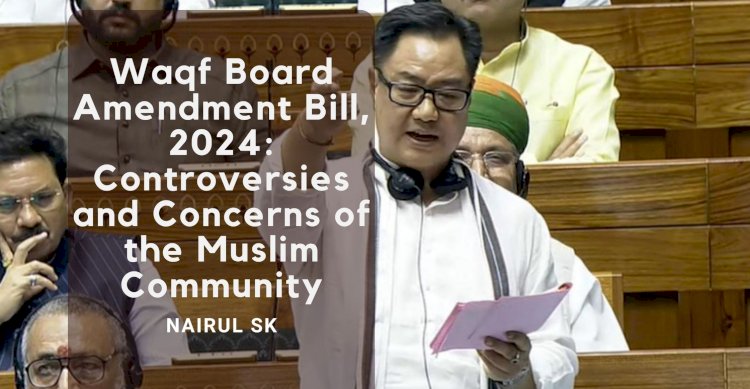



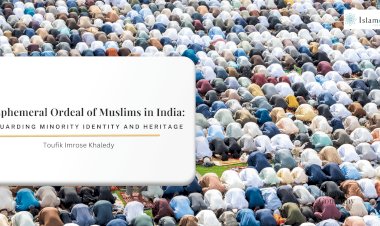
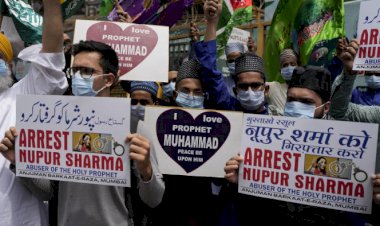
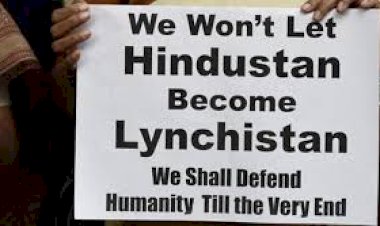
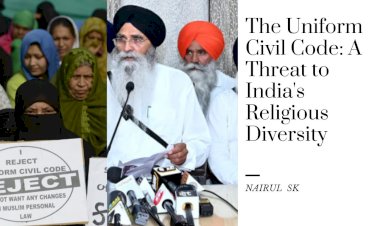
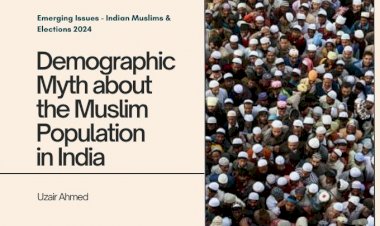
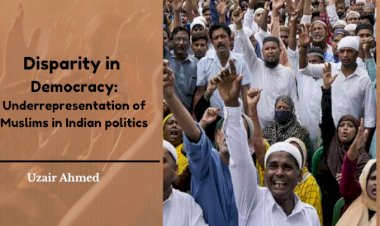














Leave A Comment